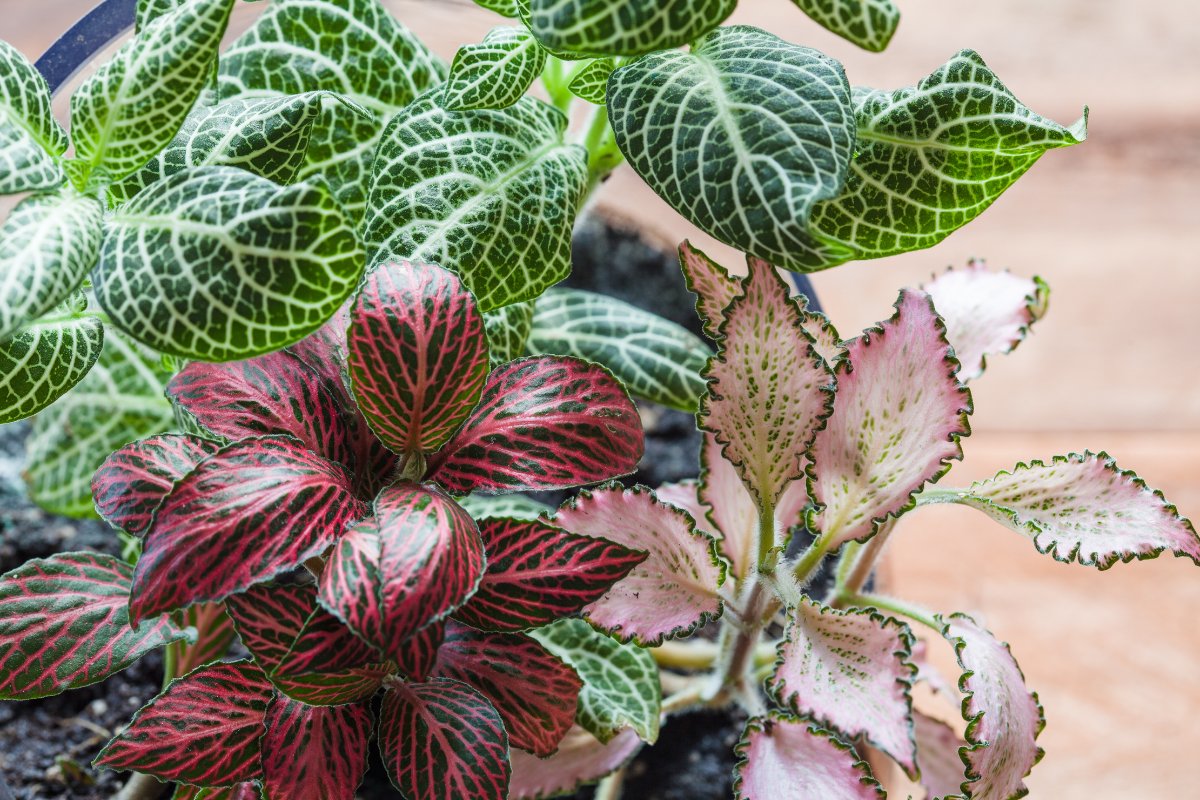Fittonias make beautiful houseplants to grow that will liven up any room. Before you grow one, you should know the best soil for fittonias. This is important so that your plant has the proper growing conditions in order to thrive.
While the fittonia makes a beautiful houseplant to grow, it can be tricky to care for as it can be temperamental. However, if you are an experienced gardener or are up for a challenge it can make a great addition to your home.
What Are Fittonia Plants?
Fittonia plants, better know as nerve plants, are a type of spreading evergreen perennials. They have delicately veined ovate leaves that are deep green in color. While the most popular vein color is silvery-white, they also come in other varieties with their veins being red, pink, white, or green in color.
Nerve plants are commonly grown as houseplants in containers. They can grow three to six inches tall and have a trailing spread of 12 to 18 inches. They are native to South America and need just the right conditions to successfully grow.
Care For Fittonia Plants
Knowing how to take care of fittonia plants is important as they can be finicky. They need specific conditions in order to successfully grow. However, with the proper care, they can make wonderful houseplants to grow.
Take Out Time to Also Read:
Light
Fittonia plants grow best in bright shady areas that replicate how they would grow in their native rainforests. It prefers bright, indirect sunlight, which you can get from north-facing windows. You should avoid growing your fittonia plants in direct sunlight.
Temperature And Humidity
Nerve plants do best with a temperature around 70 degrees Farenheit. However, they can tolerate temperatures from the low 60s to the low 80s.
The fittonia plant prefers a humid environment. They benefit from regular misting or the use of a humidifier nearby. They also do well in bathrooms as they can benefit from the steam of hot showers.
Water
How often to water fittonia can be tricky as they are sensitive. Fittonia plants should be kept regularly moist. If they become too dry they will collapse and it will be hard to bring them back to normal.
Soil – Best Soil For Fittonia Plants
Fittonia plants grow best in standard potting soil that has a peat moss base. They tend to prefer soil that is slightly acidic. Ideally, the soil should retain some moisture but drain well.
Fertilizer
During the growing season, you should feed fittonia plants a dose of liquid fertilizer made for tropical plants once a week. A good fittonia fertilizer is a balanced 5-5-5 fertilizer that has been diluted to half-strength.
The Best Soil For Fittonia Plants
Choosing a fittonia soil mix is important to ensure that your plant thrives. You want a soil mixture that will provide the nutrients and conditions for your nerve plant to successfully grow.
Miracle-Gro Indoor Potting Mix
This versatile potting mix is great for essentially all of your indoor plants, including the fittonia plant. It is specially blended for a wide variety of houseplants.
The potting mix features no compost or bark to make it less prone to gnats. It is designed to feed your plants for up to six months. It has an easy-to-water formula that holds and releases water for ideal moisture levels.
House Plant and Tropical Plant Potting Soil
This potting soil is specially formulated for use with houseplants and tropical plants. Its unique blend includes peat, perlite, worm castings, and lime.
The worm castings serve as a great plant food that is free of chemicals. The blend is all-natural so you know that it is safe to use in your home.
FoxFarm Ocean Forest Potting Soil Mix Indoor Outdoor for Garden and Plants
The light, aerated texture of this potting mix makes it great for a variety of plants. The pH level is adjusted for optimum fertilizer uptake.
For the best results in your plant’s growth, it contains a mixture of earthworm castings, bat guano, sea-going fish and crab meal, forest humus, peat moss, and more. It encourages strong, healthy growth for container plants.
Miracle-Gro Tropical Potting Mix
This potting mix is specially formulated for tropical plants to ensure they get the nutrients they need. It includes essential nutrients that tropical plants need to thrive.
Lava rocks are added for optimal drainage to provide the best growing conditions for your plants. You can use the potting mix for indoor or outdoor plants and it will feed your plants for up to six months.
Harris All Purpose Premium Potting Soil Mix with Worm Castings and Other Nutrients
This all-purpose potting mix is great for all types of plants. You can use it for indoor and outdoor plants and use it for container gardening, flower boxes, hanging baskets, and more. It contains important nutrients including iron, sulfur, calcium, nitrogen, phosphorus, and potassium.
The mixture includes pumice and perlite to promote the aeration of roots and fast drainage. To help maintain proper moisture levels it contains coco coir. The mixture includes essential ingredients such as peat moss and worm castings, which helps feed your plants so they can grow strong and healthy.
Choosing The Best Soil For Fittonia Plants
Fittonia plants make beautiful houseplants thanks to their delicately veined ovate leaves that are deep green in color with colorful veins. They can be a bit temperamental to grow, so they require plenty of dedication and experience. However, with the right steps, you can successfully grow a fittonia plant.
One of the most important aspects of growing a fittonia plant is choosing the right type of soil. They do well in a standard potting soil mix with a peat base. If the potting soil mix you have does not have a peat base, you can add some peat to it to improve the soil.
The soil should be slightly acidic and should be well-draining but still be able to maintain some moisture. There are plenty of great options of soil you can choose from for your fittonia plant.
Do you have any questions regarding the best soil for fittonia plants? If so, please ask your fittonia growing questions in the comments.






